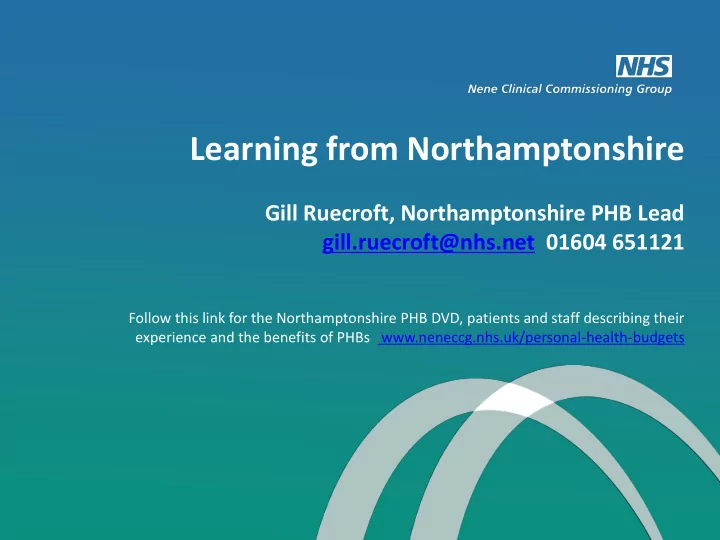

Learning from Northamptonshire Gill Ruecroft, Northamptonshire PHB Lead gill.ruecroft@nhs.net 01604 651121 Follow this link for the Northamptonshire PHB DVD, patients and staff describing their experience and the benefits of PHBs www.neneccg.nhs.uk/personal-health-budgets
What is a PHB? A person, working in partnership with their clinician, knows how much their health care costs, is supported to write a personal plan and is able to purchase services that enable them to lead a safe and fulfilling life. PHBs enable people with LTCs to have choice, flexibility and control over the healthcare and support they receive, selecting services that meet their needs in a way that is most appropriate for them
Understanding/believing the concept • Use the results of the national evaluation • Back up with real stories • Other sites’ experience • Myth busting/perceived risks • Interview people with complex needs, where traditional services have not met those needs • Clinicians can often identify these patients • Identify people who want to have a go and dive in!
Identifying the budget • Our most difficult element • Influencing managers – what’s in it for them • Use tested tools/models • Transparency • Cost neutral • Invest to save • Pump priming
Clinical/User Leadership • Clinical champions o Support them to test o Put them in touch with others who are doing it • User champions o Focus groups, feeding back experience, used to develop systems/processes o Peer network development http://www.peoplehub.org.uk/
Designing the processes/systems • Designed in partnership by users, providers and commissioners • Personal plan is the key to making PHB work and coordinate integrated services • Commission existing services i.e. council payment and monitoring for PBs • New role required: support, advocacy and brokerage • DH guidance documents
Measuring outcomes • For the pilot o Progress/achievement of health outcomes o Quality of life o Cost of care comparison • Beyond a pilot • New measures for all LTCs • Include as part of QIPP in the future
Things we have learnt in the last 3 years • PHBs are not for everyone • The culture change to a personalised approach is huge, change of conversations, relationships – NHS staff and patients • Managers/budget holders, who do not have patient contact, are difficult to engage • Most patients/representatives do understand PHBs • Most people are very responsible with the money • Personal planning is time consuming if done properly, most people need support • It is easier than we thought to identify measurable outcomes • Important to focus on outcomes, not on what they are buying
Continued…………….. • Patients must be involved in the design of the processes/systems to get them right • Market development is required so people have real choice • Tension – current provision/decommissioning to release savings • Integration – one budget and one plan for all needs • This is much more complex and much harder to implement than we envisaged! Improved quality = reduced demand on services
Questions?
Recommend
More recommend